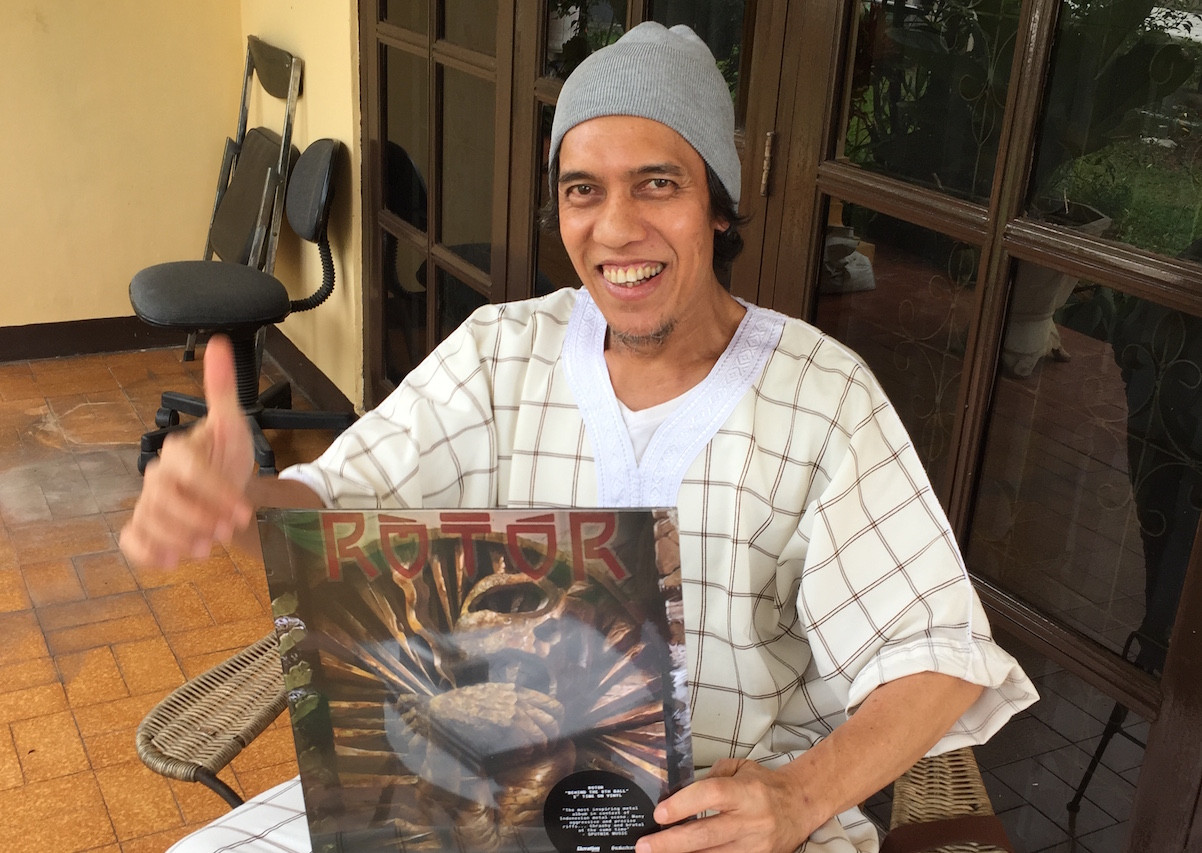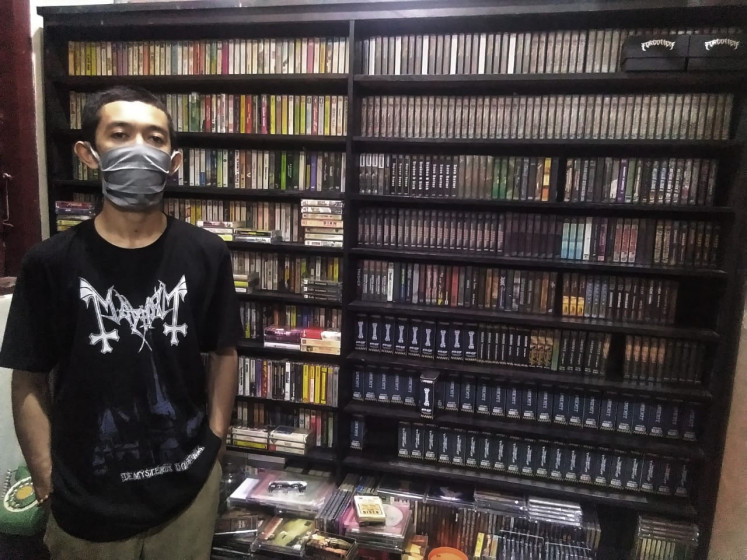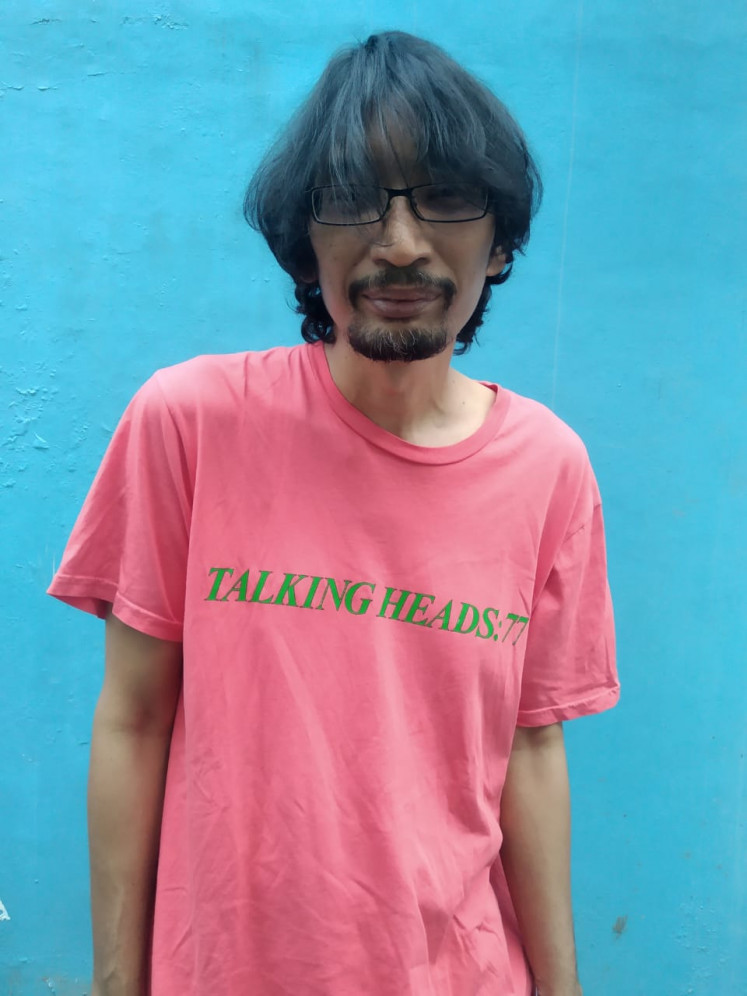Popular Reads
Top Results
Can't find what you're looking for?
View all search resultsPopular Reads
Top Results
Can't find what you're looking for?
View all search resultsThe generational legacy of Rotor, Indonesia’s metal pioneer
Musicians of different generations share their memories of the late Irvan Sembiring and his band.
Change text size
Gift Premium Articles
to Anyone
I
rvan Sembiring, the co-singer, guitarist and brain behind Indonesia’s seminal metal band, Rotor, passed away on Tuesday at the age of 51, but his legacy with Rotor has been cemented.
Rotor was among the first wave of bands paving the way for heavy metal music in the early 90s when the music industry practically shut its door to anything that was not pop or dangdut.
The band’s tenacity is well documented. Very early in their career, the band was keen to get some exposure. Having only three original songs ready, they approached a big Indonesian promoter for a chance to support Brazilian metal legends Sepultura during their Indonesian tour in 1992. They didn’t get the gig but managed to be invited to perform at the welcoming party. Having impressed everyone that night—reportedly including Sepultura themselves—they were immediately signed for what would be their debut album and the first professionally recorded metal album in Indonesia: Behind the 8th Ball.
They also landed an opening slot for the first ever Metallica shows in Jakarta a year later. However, a riot took place that night after many disappointed fans did not manage to get into the venue, causing Rotor to be temporarily banned from performing any show in the country.
Not giving up, the band relocated to the United States to try their luck for a brief period. Even though they did not find success there, Rotor kept hustling, releasing records and experimenting. There is no denying that Rotor has never shied away from delivering their art exactly the way they wanted it to be.
It was also this confidence and “stubbornness” that made Rotor and Irvan Sembiring among the most respected names in Indonesia’s metal scene, which as a result influenced a slew of younger musicians and listeners alike to this day. We asked some of them to share their memories of the late rock god.
Judha “Tempe” Herdanta, 27, guitarist of Rabu (Yogyakarta)
As a young person, how did you find Rotor?
I was cassette hunting in Yogyakarta. Pak Didik, a seller in Pasar Beringharjo, offered me Behind the 8th Ball. He said "This is the Indonesian band that opened for Metallica. Now the singer is a preacher." Curious, I bought the tape for Rp 12.000 (86 US cents). Upon first listen, I was stunned. I didn’t know there was music this heavy in Indonesia in 1992. I thought Roxx was the heaviest.
How did Rotor influence you or your musical project?
Rotor’s guitar riffs changed my mindset about what makes a guitarist good. And their lyrics were astounding, especially on “Gatholoco.” It’s possibly the first thrash metal number with Javanese lyrics. It blew my mind. “Curse of Leak” is also a personal inspiration when I’m trying to find dark themes for Rabu [laughs].
Fakhtur “Ifat” Rohman, 23, owner of Delusive music shop (Semarang)
Fakhtur “Ifat” Rohman, says that many young rock bands are influenced by Rotor's brand of heavy metal (Personal collection/Courtesy of Fakhtur “Ifat” Rohman)Do young people still listen to Rotor?
A lot of current music is a throwback to the 80s and 90s. For example, Black Horses, which hearkens back to Led Zeppelin, or Semarang’s very own Ventor, which brings back that thrash-y Kreator sound. A lot of today’s rock/metal music is a tweak on the old-school sound with better production.
What made you idolize the band?
Rotor made heavy music accepted by the mainstream. This was during the New Order era when anything deemed too “Western” was banned. If there was a metal music museum in Indonesia, Rotor’s logo should be the monument.
Ricky Siahaan, 44, guitarist of Seringai and Step Forward (Jakarta)
What made Rotor stand out?
In the early 90s, almost all local bands were cover bands. But Rotor had [courage] to play original tunes pretty early on and release an album [...] Releasing an extreme metal album was super difficult and expensive unless you had the backing of a big record label. That’s what made me admire Irfan. He was a risk taker, a hard worker and never gave up.
How did Rotor influence you?
Musically, I’m more influenced by the guitarist from Roxx. However, Irfan showed me that running a band requires hard work and determination. Being a band is way more than just about writing songs. When playing “extreme” music, you need to have guts and the courage to take risks. In my opinion, this is Irfan’s legacy to Indonesia’s metal scene.
Favorite Rotor song?
The song “Behind the 8th Ball” from the album of the same name. This song is relentless and the arrangement is unpredictable. Nothing about it is commercial. It’s heavier than a lot of big, foreign thrash metal bands. Thrash is supposed to be challenging, and that’s what the song was.
Muhammad Fahri, 35, lead guitarist of Kelelawar Malam (Jakarta)
Did you like Rotor right away?
Nope [laughs]. Their production was too lo-fi [home-recorded]. I had been used to cleaner production and on-time drum beats. It’s actually their record that got me into a more lo-fi sound.
What made them different?
They weren’t stuck on genres in delivering their art. A lot of metal bands would release 12 albums with little difference in composition, but Rotor were on the other side of the fence. They would change their sound completely within a few years. It’s pretty extreme and bold. That definitely influenced me.
Bin Harlan Boer, 44, singer-songwriter (Jakarta)
Harlan Boer admired Irvan Sembiring's drive to keep changing the sound of his music (Personal collection/Courtesy of Harlan Boer)You saw Rotor opening for Metallica, how were they?
It was my third time seeing them live. I remember on “Pluit Phobia,” the singer Jodie came on stage wearing all white, which is not very metal [laughs]. He mimicked a policeman’s voice when stopping a civilian and went "May I see your license and registration please?". That was something. “Pluit Phobia” was a criticism of a hot issue circulating at the time that the government was going to implement huge penalty fees for traffic violations and how it would just open a new avenue for corruption through bribe money.
As a non-metal musician, how did Rotor influence you?
Irfan’s individualism really spoke to me. He kept creating things that were different from most people. The cover of New Blood shows a picture of Rotor’s drummer as a toddler, and the rest of the band feature on the album sleeve. It left such an impression on me that [my old band] C’mon Lennon used a similar approach on our album cover.
Eka Annash, 44, lead singer of The Brandals and bassist of Zigi Zaga (Jakarta)
You look up to Rotor’s Irfan, why?
I like artists that do things beyond expectations and simply follow their creative instincts. Irfan was one of those people. He didn’t want to just make music, he wanted to be ahead of everyone. He left Suckerhead, which was already big in the metal scene, to form Rotor because he wanted to play the fastest thrash metal at the time. When that sound got popular, he started incorporating industrial elements and made Rotor's music challenging again.
What’s the legacy of Irfan or Rotor for the Indonesian music scene?
He did what visionaries like David Bowie, Prince [and others] did. He did things on his own terms and did not conform to the standards, to execute his vision at any cost until eventually it wasn’t him that had to adapt to his surroundings, but the other way around. Although it might have taken him forever to make that happen, at the end that’s what made him a pioneer.













